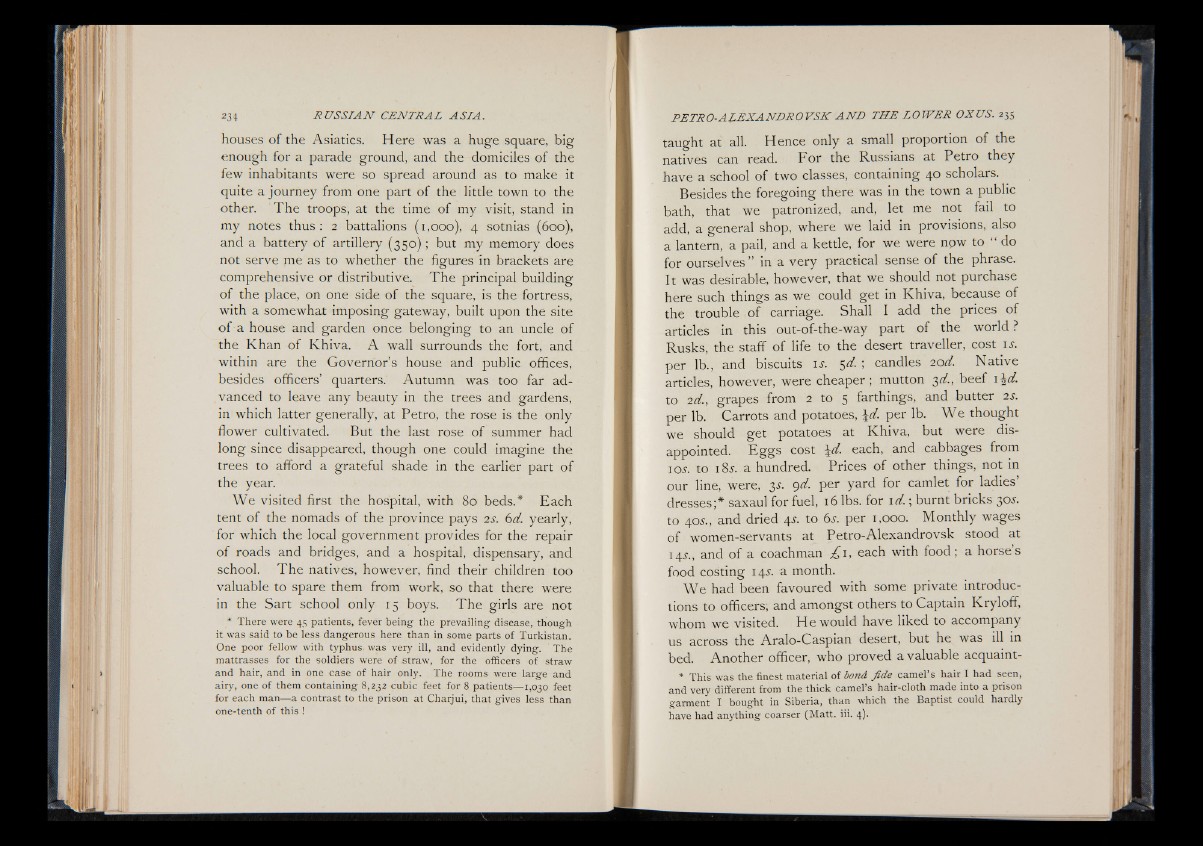
houses of the Asiatics. Here was a huge square, big
enough for a parade ground, and the domiciles of the
few inhabitants were so spread around as to make it
quite a journey from one part of the little town to the
other. The troops, at the time of my visit, stand in
my notes thus: 2 battalions (i,ooo), 4 sotnias (600),
and a battery of artillery (350); but my memory does
not serve me as to whether the figures in brackets are
comprehensive or distributive. The principal building
o f the place, on one side of the square, is the fortress,
with a somewhat imposing gateway, built upon the site
o f a house and garden once belonging to an uncle of
the Khan of Khiva. A wall surrounds the fort, and
within are the Governor’s house and public offices,
besides officers’ quarters. Autumn was too far advanced
to leave any beauty in the trees and gardens,
in which latter generally, at Petro, the rose is the only
flower cultivated. But the last rose of summer had
long since disappeared, though one could imagine the
trees to afford a grateful shade in the earlier part of
the year.
We visited first the hospital, with 80 beds.* Each
tent of the nomads of the province pays 2s. 6d. yearly,
for which the local government provides for the repair
of roads and bridges, and a hospital, dispensary, and
school. T he natives, however, find their children too
valuable to spare them from work, so that there were
in the Sart school only 15 boys. T he girls are not
* There were 45 patients, fever being the prevailing disease, though
it was said to be less dangerous here than in some parts of Turkistan.
One poor fellow with typhus, was very ill, and evidently dying. The
mattrasses for the soldiers were of straw, for the officers of straw
and hair, and in one case of hair only. The rooms were large and
airy, one of them containing 8,232 cubic feet for 8 patients— 1,030 feet
for each man— a contrast to the prison at Charjui, that gives less than
one-tenth of this !
taught at all. Hence only a small proportion of the
natives can read. For the Russians at Petro they
have a school of two classes, containing 40 scholars.
Besides the foregoing there was in the town a public
bath, that we patronized, and, let me not fail to
add, a general shop, where we laid in provisions, also
a lantern, a pail, and a kettle, for we were npw to “ do
for ourselves ” in a very practical sense of the phrase.
It was desirable, however, that we should not purchase
here such things as we could get in Khiva, because of
the trouble of carriage. Shall I add the prices of
articles in this out-of-the-way part of the world ?
Rusks, the staff of life to the desert traveller, cost is.
per lb., and biscuits is. 5d. ; candles 20d. Native
articles, however, were cheaper; mutton $d., beef i\d.
to 2d., grapes from 2 to 5 farthings, and butter 2s.
per lb. Carrots and potatoes, Id. per lb. W e thought
we should get potatoes at Khiva, but were disappointed.
E g gs cost \d. each, and cabbages from
1 os. to 18s. a hundred. Prices of other things, not in
our line, were, 3s. 9d. per yard for camlet for ladies
dresses;* saxaul for fuel, 16 lbs. for id .; burnt bricks 30s.
to 40s., and dried 4s. to 6s. per 1,000. Monthly wages
of women-servants at Petro-Alexandrovsk stood at
14s., and of a coachman £ 1 , each with food; a horses
food costing 14s. a month.
W e had been favoured with some private introductions
to officers; and amongst others to Captain Kryloff,
whom we visited. He would have liked to accompany
us across the Aralo-Caspian desert, but he was ill in
bed. Another officer, who proved a valuable acquaint-
* This was the finest material of bond fide camel’s hair I had seen,
and very different from the thick camel’s hair-cloth made into a prison
garment I bought in Siberia, than which the Baptist could hardly
have had anything coarser (Matt. iii. 4).